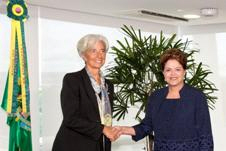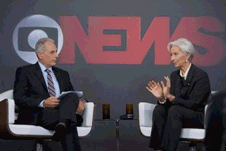
Typical street scene in Santa Ana, El Salvador. (Photo: iStock)
IMF Survey: Emerging Markets Seen as Part of Solution to Global Problems
December 2, 2011
- Lagarde wraps up visit to Latin America as Mexico takes over leadership of G-20
- Praises Brazil as a leading actor on global economic stage
- Says emerging markets can help in global solution to key problems
IMF Managing Director Christine Lagarde, wrapping up a visit to Latin America, said that the balance of economic power was shifting and that emerging economies were part of the solution to global problems.

Christine Lagarde meets Brazilian President Dilma Rouseff during her five-day visit to Latin America (photo: Roberto Stuckert Filho)
Latin America
Lagarde, completing a trip to Latin America during which she met with leaders of Brazil, Mexico, and Peru, said that over the past decade, Brazil has had a remarkable trajectory, “combining economic stability, growth and significant progress in reducing poverty and inequality—even becoming an international benchmark in that area. In the process, the country has established itself as a leading actor on the global economic stage.”
Lagarde, who earlier in the week was in Mexico ahead of it taking over the leadership of the Group of Twenty (G-20) industrial and emerging market countries, met on December 1 with Brazilian President Dilma Rousseff, and held productive meetings with Finance Minister Guido Mantega and Central Bank President Alexandre Tombini.
Shifting balance of power
“As the balance of economic power shifts, emerging economies are a key part of the solution to the global problems. Brazil consistently presents an important voice to the world on behalf of the interests of emerging and developing economies,” she said in a press release.
“This is a critical role. We welcome the Brazilian authorities’ willingness to consider contributing additional resources to the IMF. The country’s active involvement in governance reforms has been an instrumental force for positive change. This is a critical contribution to making the IMF more representative of the global reality, thus more legitimate and effective.”

Lagarde with Globonews network anchor William Waack during an interview in São Paulo, Brazil
Less visible
During a television debate on the final day of her visit to Brazil, Lagarde said the IMF was working behind the scenes to help with the European crisis.
“I'm very happy if the IMF is in the middle of it, but in an effective way, not necessarily a visible way,” Lagarde said in the recording of a Globo News TV news program in São Paulo.
Lagarde urged euro zone countries to find a collective, comprehensive solution to the crisis or risk enduring a lost decade.
Not immune
Lagarde praised the management of the Brazilian economy.
“The marked resilience of the Brazilian economy is the product of a strong track record of competent macroeconomic management based on the three pillars of fiscal responsibility, inflation targeting and flexible exchange rate. In the last few years, Brazil has also benefited from a solid and well-capitalized banking sector, which has so far softened the impact of one important channel of contagion from the global financial crisis,” she said.
“But that is not to say Brazil is immune to the crisis. In our highly interconnected world, nobody is. For Brazil, the challenge is now is to find the right balance between supporting growth and at the same time guiding inflation to converge to the central bank’s target. And do all that while at the same time protecting—and even expanding—its social spending and improving infrastructure.”


